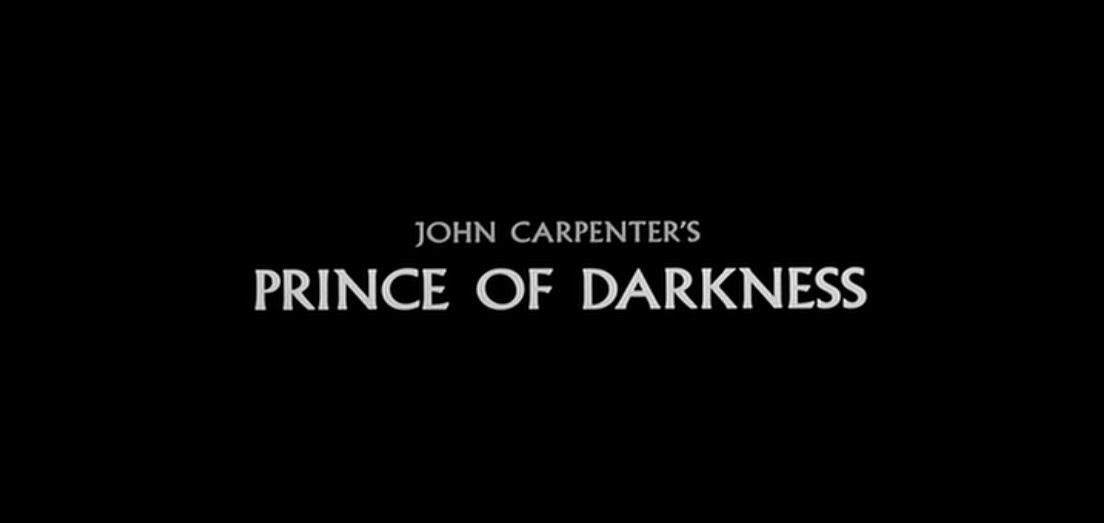That time John Carpenter found the devil in quantum physics
The surprising depth in this little-known gem by a legendary film-maker

Catholic priests and scientists aren't supposed to agree about the nature of the world.
That's key to the mythology of our modern age.
The Science shows us that the world is nothing but matter and energy out there banging around.
Christianity is a hangover from a less enlightened age when man still believed in gods and demons haunting the night.
The scientists turned a floodlight on the dark and discovered it was all an illusion. There's nothing out there but more particles banging around.
John Carpenter's Prince of Darkness takes that idea out with the trash
Today's viewer can't help but notice how Carpenter totally fails to ridicule the Christian faithful in the name of atheist materialism.
Any snark-filled sci-fi film worth its salt today couldn't wait to sink its ironic venom into the soft necks of any character stupid enough to believe in God.
Religious characters must be dull, emotionally troubled people prone to psychotic meltdowns.
While Carpenter isn't quite a friend to the Christian believer, he's not an outright opponent. That by itself makes for a more interesting sort of story than the one-sided hit piece.
The film's premise is standard horror-movie stuff
Satan's alive and well as a green goo locked in a million year old glass jar, hidden away by a secret order in the Catholic church.
Then we add a team of 80s grad students led by the sorcerer Egg Shen – no, wait, hang on, that's long-time Carpenter collaborator Victor Wong, playing a physics professor.
The character of the priest, played by Donald Pleasance, brings these jaded academics into the fold of the church – literally, as this is where the action takes place.
But it's the metaphorical dimension where this tension between modern science and old-time religion gets interesting.
The thematic core of the movie sets it apart from a B-tier hack-n-slash
What if the weird world of quantum physics and the religious doctrines of Christianity were two ways of describing the same thing?
The professor of physics teases the viewer with hints of the weird quantum world, which challenges all of our intuitions about matter and time and causality.
The Catholic priest tells a secret tale of the Church's origins – hinted to be aliens – as a defense mechanism against the circulating green goop and the chaotic "Anti-God" it seeks to revive.
What if the creator of the universe were incompatible with our experiences of the world?
You can watch this film as a group of hapless 20-somethings stumbling blind into an ancient horror as they're picked off one by one.
That's the low-level viewing.
The dialogue between science and religion is the real meat of the story. Carpenter dramatizes this effectively, using mildly graphic action to show us the darkness waiting just outside the lights of reason.
It turns out that those illuminating spotlights didn't show the scientists as much as they thought.
Our confidence in science turns out to be a fatal arrogance.
But what if it turned out that God was not the benevolent creator of Christianity, either?
That's the truly unsettling message of the film
What if religion were all a sham? What if the force sustaining the all creation was an inverted, evil power?
If science turns out to be powerless against the chaotic forces of reality, religion is not exactly in a better position.
That's the conclusion of at least one character.
And a bleak conclusion it is. That, combined with the "explaining" of religion in materialistic terms, might seem like talking down to any religious-minded viewers.
It might seem like an entirely pessimistic conclusion.
This is compounded by the prophetic dreams which appear to be broadcast into the mind from the far-off future year of... 1999.
But it's not so simple as that
The fusion of religion and science doesn't get rid of faith in the name of all-knowing science.
That's how it would go in any of today's snark-fests.
Carpenter's bold enough to challenge that central dogma of the modern age.
Good and Evil aren't found only in the hearts and minds of human being.
Evil is more than the corruption of the human will.
These aren't subjective projections on to a neutral reality of facts.
Good and Evil are real and objective aspects of the natural order. As real and natural as the particles studied by physicists.
The climax of the film shows us the physical embodiment of that evil in all its glory.
What about that mysterious figure seen leaving the church in the time-warped dream from the future?
The question of freedom and fate hangs over the conclusion of the film. Carpenter's a wise enough storyteller to leave that question unanswered.
Whether that future can be prevented, or whether fate wins, would tell us a great deal about the prospects of Good in a universe of quantum evil.
We don't get those answers. Rightly so.
The unresolved tension between two potent but incomplete worldviews is much more interesting getting all the answers handed to you
PS – If you enjoy these posts, why not subscribe? That way you can receive them directly in your inbox... and you'll get the members-only posts.
There's no charge (yet) to subscribe as a free member, so click here and join now.

